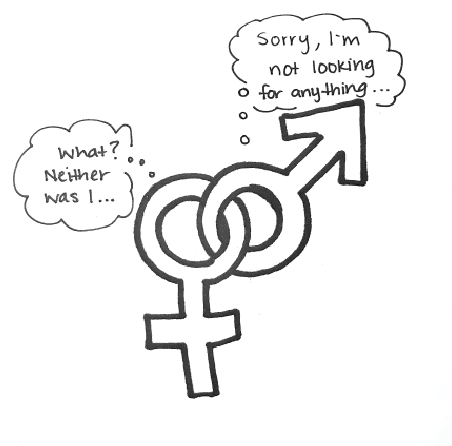
You’re sitting in McEwen on a Thursday afternoon eating lunch with your friends. The person you’ve been hooking up with for the past four weeks is sitting with their friends across the dining hall. As you get up to put your plate away, you awkwardly make eye contact and wave. When you go out later that night, you make eye contact across the room at the VT, but he doesn’t approach you. Why? You hooked up last Saturday, and last Friday, and everything was fine. The next morning you sit in Commons in sweatpants and see him again. Still no wave. Eventually, you get a text. Sorry I didn’t see you this weekend. I’ve had a lot of fun hooking up but I’m not really looking for anything serious right now, so we should just be friends. Sorry, it’s not you, it’s just where I’m at right now. Confusing! What indication did you give that you wanted this to be anything but casual? You flip back through the mental catalogue of your interactions to see where you went wrong. Truthfully, you hadn’t even thought to bring up the “what are we?” conversation. So how did this happen?
Transitioning from having casual sex to something more serious is never an easy path to navigate. It’s often plagued with fumbling words and awkward questions all in an attempt to mask the fact that you may have feelings for someone. In any heterosexual pairing, gender can play a significant role in these interactions — but why? This ritualized back-and-forth of “he has to text me first” or “he has to bring up if we’re exclusive or not” is an entirely pre-established framework for relationships and is, quite frankly, bullsh*t.
All too often, two people have been engaging in a casual sexual relationship, only for it to be ended with the excuse of “I don’t want a relationship right now.” But why is this assumption made? It is an all-too-familiar story of men ending a casual relationship out of fear that it will develop into something more serious. Believe it or not, however, it is possible for women to want casual sex and not a relationship. Not every person that you have sex with is planning your wedding after only hooking up once. Saying “hi” to someone when you see them isn’t a desperate cry for commitment.
These expectations have become intrinsically gendered. It is assumed that when engaging in a casual sexual relationship, the woman will always be hunting for more and seeking an emotional commitment. These perpetuated norms create a rigid social order when it comes to relationships and sex. This pre-established hierarchy within hookup culture strips women of their agency, as they are not allowed to be empowered to ask for what they want out of a relationship. In turn, men are always in control as the ball is perpetually in their court, and women are unable to advocate for themselves. However, being able to have this voice and this agency without being deemed an absolute psychopath is critical in order to have a healthy sexual relationship. The fear of having an open and honest conversation about the state of your relationship is completely irrational, and sets an unhealthy precedent for the future.
Forget the emotional aspect of trying to define a relationship — there’s a whole host of other health-related things to be addressed. Don’t you want to know what kind of germ pool you are exposing yourself to when you have sex with someone? Especially when it comes to using condoms, it is 100% reasonable to want to know if you are potentially exposing yourself to an STD. If you are hooking up with someone and not using condoms, it is very reasonable to ask if they have been with anyone else. In that context, asking has absolutely nothing to do with being “exclusive,” but has everything to do with avoiding an STD (which is understandable). These kinds of conversations are a critical aspect of maintaining both your physical and emotional health. Sometimes it seems like someone literally would rather get an STD than have a conversation about the status of their relationship. Weird.
Although having agency in your relationship may be terrifying to your partner, don’t let that deter you. Any partner who is too afraid to talk about your relationship for the purpose of you being physically healthy is not someone with whom you should be sleeping in the first place. The fact that women are constantly labeled “crazy” or “clingy” is a type of justification that borders on sexist.
Putting women a box that labels them as commitment-seeking and needy when they are just trying to make conversation or feel less awkward is so incredibly presumptive and problematic. Not letting women advocate for themselves about what they want out of a relationship can be dangerous territory, and is just bad practice when it comes to relationships overall. Having a fear of communication in any kind of relationship is a bad habit to maintain, and is especially problematic among gendered lines. Therefore, we shouldn’t be afraid to have these conversations to do away with these normalized power dynamics. Hopefullywwe can all be a little more honest, even if it’s just casual sex.

















